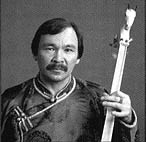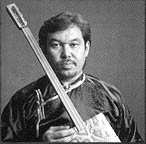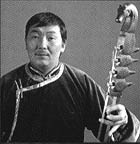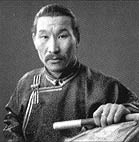Huun-Huur-Tu
|
Repubblica di Tuva , Russia |
 |
|
Repubblica di Tuva , Russia |
 |
|
|
|
|
Il gruppo:
Kaigal-ool Khovalyg
voice, igil, doshpuluur
Andrey Mongush
voice, byzaanchi, khomuz, amarga
Sayan Bapa
voice, doshpuluur, marinhuur, guitar
Alexei Saryglar
voice, tungur (drum), dazhaaning khavy (rattle)
|

|
Kaigal-ool Khovalyg An extremely talented, self-taught overtone singer, Khovalyg worked as a shepherd until the age of 21, when he was invited to join the Tuvan State Ensemble. He settled in Kyzyl and started teaching throat singing and igil. A co-founder of Huun-Huur-Tu, he left the State Ensemble in 1993 to devote his attention to the newly formed quartet. He has performed and recorded with the Tuva Ensemble, Vershki da Koreshki, the World Groove Band and the Volkov Trio. Covering a range from tenor to bass, Khovalyg is particularly known for his unique rendition of the khöömei and kargyraa singing styles. |
 |
Sayan
Bapa Sayan Bapa, child of a Tuvan father and Russian mother, grew up in the industrial town Ak-Dovurak. He received his musical training in Kislovodsk, Northern Caucasus, where he played fretless bass in a Russian jazz-rock band for several years. In the early 1990s he returned to Tuva to study his roots, and became a member of a folk-rock band, performing traditional Tuvan music on electric instruments. A co-founder of Huun-Huur-Tu, Bapa is a versatile string instrumentalist, and performs on the doshpuluur, igil and acoustic guitar. As a vocalist he is currently specializing in the kargyraa style. |

|
Andrey
Mongush Andrey Mongush was first introduced to throat singing at the age of 13 while helping his grandparents herd their animals. Although he attended college and earned a degree in agriculture in 1991, he won numerous singing contests at the same time. Mongush decided to continue singing, specifically studying Tuvan indigenous instruments and throat singing. He graduated in 1997 with a degree specializing in the teaching of Khöömei and the use of Tuvan instruments. After receiving national recognition for his work with middle school children he was asked to join Huun Huur Tu in May of 2003. |

|
Alexei
Saryglar Alexei Saryglar joined the ensemble in 1995 to replace Alexander Bapa.
He completed his musical training in Ulan Ude as a percussionist for
classical and popular music, and became a member of the large Russian
state ensemble 'Siberian Souvenir'. A multi-talented performer, Saryglar
makes his mark as a sygyt singer, and his expertise with
traditional Tuvan percussion and string instruments naturally extends
into the art of piano playing. Like the other members of the ensemble,
he resides in Kyzyl when not on tour. |